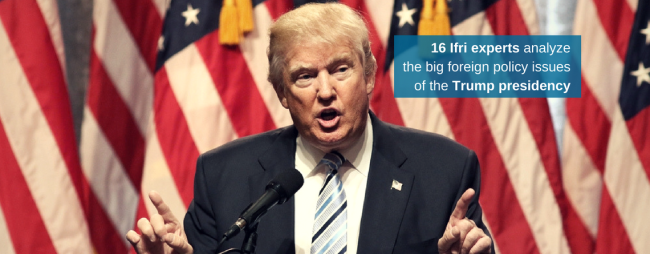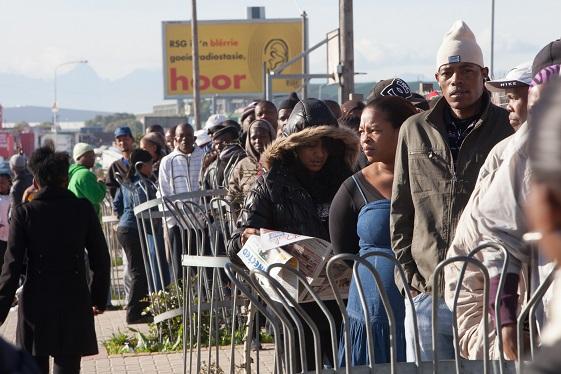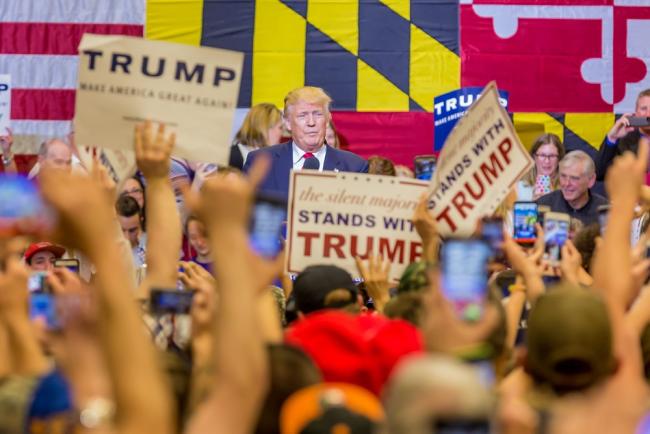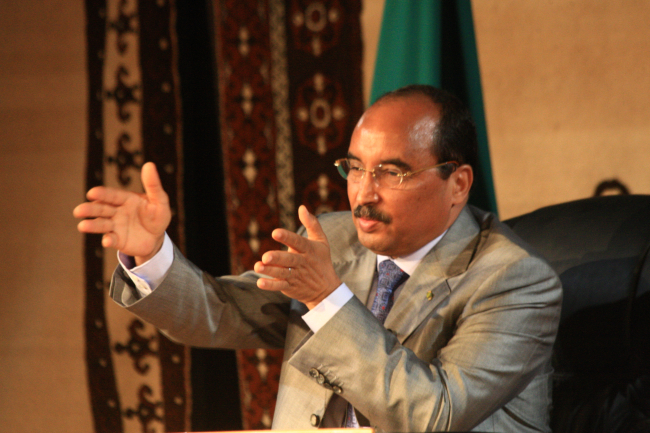Elections
The electoral process sets the pace for democratic life and international news. In some countries, elections are no more than a façade for democracy.


Democratic Deconstructions
Today’s democratic governments appear less legitimate and their longevity less assured than ever.
Le monde selon Trump. Anticiper la nouvelle politique étrangère américaine
What will become of US foreign policy under Donald Trump? A selection of Ifri researchers has come together to offer their thoughts on this question. Our experts cover an array of topics through 14 contributions, ranging from the future Sino-American relations, through US engagement in the Middle East, to the prospects of a renewed transatlantic relationship. This analysis intends to help readers anticipate the outcomes of this election in order to facilitate decision-making.
America First… and Europe Last? What will the Trump Presidency mean for Europe
After the audacity of hope, the rage of hopelessness has thus propelled Donald Trump to the White House. In a tamed but still tragic repetition of history, the economic crisis of 2008 has eventually produced its eventual political outcome, embodied in a farcical show-businessman who proudly cultivates contempt for the liberal institutions of Washington while supporting the authoritarian politics of Moscow. The consequences of this Trump moment will be profound for America, they may be even more crucial for Europe. That American elections are a global phenomenon is not new. But for the first time since World War II, an overtly nationalist, proud protectionist and self declared neo-isolationist will become the leader of the free world.
South African Local Elections 2016. From One Party Dominance to Effective Plural Democracy
The South African political landscape experienced a shock from an unlikely source; the country’s local government elections on August 3, 2016 representing the last tier of government and often overlooked in favour of national and provincial polls.
Trump et l'électorat populaire blanc
Donald Trump won the 2016 Republican primaries thanks to the mobilization of a specific part of the electorate: the white, non-college-educated, lower middle-class.
Trump's Vice President: Attempting to heal the Republican rift
The announcement of Mike Pence as Republican presidential nominee Donald Trump’s running mate on July 15 was decidedly lackluster, if not downright awkward. Far from his normal persona of self-assurance to the point of hubris, Trump seemed uncomfortable and even nervous throughout, shifting plans and issuing contradictory statements in the days leading up to his running mate’s finalization.
As Pence’s name began to circulate last week, Trump signaled his malaise by insisting that the leaks were not a “final, final decision,” revealing his inability to confidently stick to Pence. Trump cancelled his first joint event with Pence scheduled for Friday, citing a desire to pay tribute to the victims of the attack in Nice, France the day prior; regardless, Trump drew attention back to himself and announced his choice on Friday evening anyway, via Twitter. Insiders reported that Trump sought assurance from advisors that Pence was the man for the job, even as Trump’s campaign fielded a last-minute appeal from New Jersey Governor Chris Christie.
The selection of Pence represents Trump committing himself to the Republican Party and its unification. Alliance building is Trump’s strategy, but drawing in Republicans is risky as it requires shunning others. A polarizing candidate is what Trump feels his campaign needs but comes with the unease of sacrificing his ability to say or do whatever he pleases, Trump’s characteristic trademark.
États-Unis : les nominations à la Cour suprême, enjeu des élections de 2016
With the death of Justice Antonin Scalia on February 13, 2016, the Supreme Court of the United States lost a beacon of conservative thought and one of the most influential American jurists of the last thirty years. The question of his replacement immediately became an issue as the United States looks forward to the presidential election in November. While past nominations to the Supreme Court have been relatively uncontentious, nominations today are affected by the polarization of American politics.
Hillary Clinton's Email "Scandal": How Will It Affect the Election?
With the Democratic Presidential Nomination in sight, Hillary Clinton must still contend with a continuous conversation about her email practices. How will this scandal, or non-scandal, affect the presidential race yet to come? A look at the perspectives of the American constituency and pending investigations may predict Clinton's likely future... and the future of the American presidency.
The faded star of President Mohamed Ould Abdel Aziz
The Mauritanian President, Mohamed Ould Abdel Aziz, was elected in 2009. The architect of two successful coups: in 2005 against President Maaouya Ould Sid’Ahmed Taya, and in 2008 against President Sidi Ould Cheikh Abdellahi, nowadays he is in his second and last term of office according to the Mauritanian constitution. He is viewed by the country's partners as one of the key figures in the stability of the Sahel. However, the international community does not see, or pretends not to see, the weakening of his regime.
Najib Razak’s Malaysia: A solid economy on a foundation of political tension
Najib Razak began his term as Prime Minister of Malaysia in 2009 amidst a severe global economic crisis, concern over spiraling public debt and fears the country would fall into the ominous “middle income trap”.
Support independent French research
Ifri, a foundation recognized as being of public utility, relies largely on private donors – companies and individuals – to guarantee its sustainability and intellectual independence. Through their funding, donors help maintain the Institute's position among the world's leading think tanks. By benefiting from an internationally recognized network and expertise, donors refine their understanding of geopolitical risk and its consequences on global politics and the economy. In 2025, Ifri supports more than 80 French and foreign companies and organizations.












